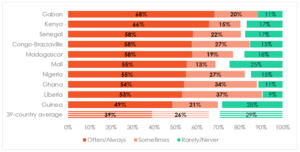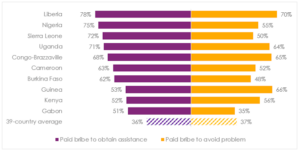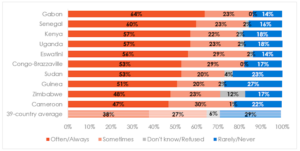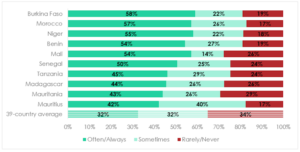Corrupt, brutal and unprofessional? Africa-wide survey of police finds diverging patterns
Africans generally have a low regard for the quality of policing on the continent. Perceptions of police misconduct, corruption and brutality are widespread, according to a new survey by Afrobarometer. The independent research network surveyed 39 countries between 2021 and 2023.
“Our survey offers new evidence of how Africans experience and assess their police. It shows people often have to contend with demands for bribes from police officers. But assessments varied by country: in some, police were said to be helpful. Afrobarometer currently surveys 39 of Africa’s 55 countries”.
“As researchers at Afrobarometer, we have published on police professionalism and other government institutions for several years.Get your news from people who know what they’re talking about. Our analysis also reveals that negative perceptions of police professionalism and corruption go hand in hand with low public trust in the police, poor marks on government performance, and citizens’ sense of insecurity.”
Encounters with police
While some citizens seek assistance from the police (to report a crime, for example), others might only encounter the police in less voluntary situations, such as at a checkpoint or traffic stop or during an investigation.
Across the 39- Country sample, only 13% of respondents said they had requested police assistance during the previous 12 months. Three times as many (40%) reported encountering the police in other situations.Among respondents who asked for police assistance, more than half (54%) said it had been easy to get the help they needed. More than three-fourths found it easy in Burkina Faso (77%) and Mauritius (76%), though no more than half as many said the same in Malawi (37%), Madagascar (37%) and Sudan (33%).Many respondents reported a police practice that was less than helpful: stopping drivers on the road without a valid reason.
On average, 39% of Africans said the police “often” or “always” stopped drivers without good reason, in addition to 26% who said they “sometimes” did so (Figure 1). The practice is particularly widespread in Gabon (68% often/always) and Kenya (66%). In contrast, fewer than one in five respondents in Ethiopia (18%), Cabo Verde (16%) and Benin (16%) had this complaint.

Both seeking police assistance and being stopped on the road may be a prelude to being asked for money. Among respondents who said they had asked for police assistance during the previous year, 36% said they had had to pay a bribe, give a gift or do a favour to get the help they needed (Figure 2).This proportion reached astonishing levels in Liberia (78%), Nigeria (75%), Sierra Leone (72%) and Uganda (71%).
Similarly, among citizens who encountered the police in other situations, 37% said they had to pay a bribe to avoid a problem. Liberia (70%) again ranked worst, joined by Guinea (66%), Congo-Brazzaville (65%) and Uganda (64%). Seychelles and Cabo Verde performed best on both counts (1%-4%).
Considering how many Africans personally experience having to bribe the police, it may not be surprising that on average across 39 countries, the police were more widely seen as corrupt than civil servants, officials in the presidency, or any other public institutions or leaders the surveys asked about. Almost half (46%) of respondents said that “most” or “all” police officials were corrupt.

Police brutality
One of the harshest criticisms levelled against some police officers was that they used excessive force in their interactions with the people they were meant to serve and protect.As Figure 3 shows, almost four in 10 respondents (38%) said the police “often” or “always” used excessive force in managing protests or demonstrations. Another 27% said they “sometimes” did so. Only 29% said the police were “rarely” or “never” guilty of brutality in their handling of protesters. The perception of frequent police brutality against protesters was most common in Gabon (64% often/always) and was widespread in some countries that are scheduled to have national elections this year, including Senegal (60%), Guinea (51%) and Tunisia (45%).

Police professionalism
Do these popular perceptions add up to a police force that is seen as professional?
Only one-third (32%) of respondents said the police in their countries “often” or “always” operated in a professional manner and respected the rights of all citizens, while 32% said they “sometimes” and 34% said they “rarely” or “never” did (Figure 4).In just five countries did more than half of the respondents think their police usually acted professionally: Burkina Faso (58%), Morocco (57%), Niger (55%), Benin (54%) and Mali (54%). Senegal ranked sixth, at just 50%. Fewer than one in five respondents saw police as usually professional in Sierra Leone (19%), Eswatini (19%), Kenya (18%), Congo-Brazzaville (17%) and Nigeria (13%).

Significance of findings
These findings raise questions about the quality of policing on the African continent, highlighting notably negative experiences and evaluations of the police in many – but not all – countries. For example, in Burkina Faso, Morocco and Benin, police scored relatively well across multiple performance indicators.More broadly, our findings point to broad cross-country patterns of how police professionalism, integrity and respectful conduct are correlated with more positive citizen attitudes towards the police.
African governments looking to change the unfavourable public perceptions of the police – and of government performance in the fight against crime – might take a closer look at which dimensions of police performance matter in their country, and which better-performing police forces might have solutions to share.
All graphics have been redacted from showing 39 countries to 10 because of space constraints.
Follow the Neptune Prime channel on WhatsApp:
Do you have breaking news, interview request, opinion, suggestion, or want your event covered? Email us at neptuneprime2233@gmail.com




